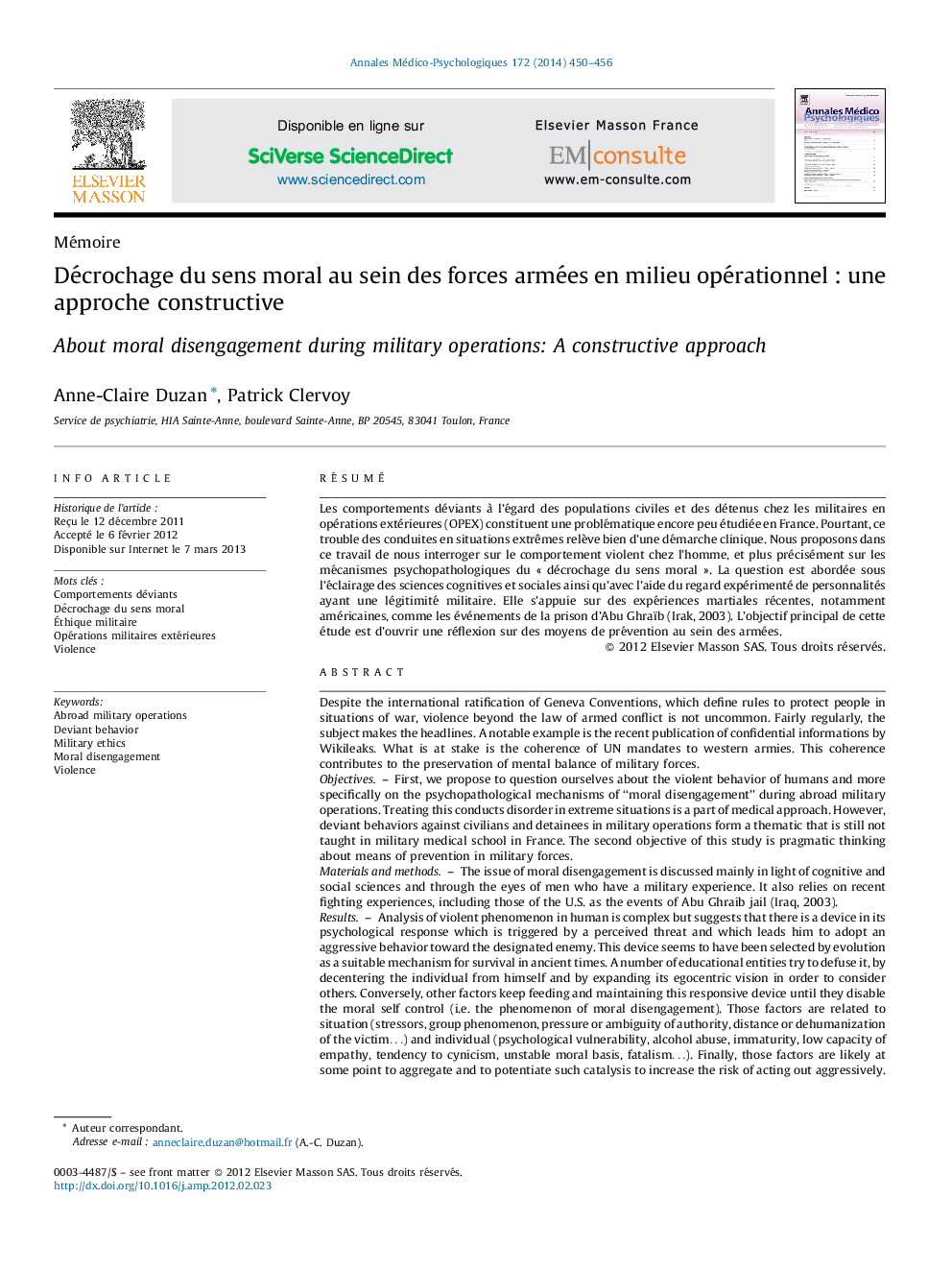| کد مقاله | کد نشریه | سال انتشار | مقاله انگلیسی | نسخه تمام متن |
|---|---|---|---|---|
| 313791 | 534537 | 2014 | 7 صفحه PDF | دانلود رایگان |

RésuméLes comportements déviants à l’égard des populations civiles et des détenus chez les militaires en opérations extérieures (OPEX) constituent une problématique encore peu étudiée en France. Pourtant, ce trouble des conduites en situations extrêmes relève bien d’une démarche clinique. Nous proposons dans ce travail de nous interroger sur le comportement violent chez l’homme, et plus précisément sur les mécanismes psychopathologiques du « décrochage du sens moral ». La question est abordée sous l’éclairage des sciences cognitives et sociales ainsi qu’avec l’aide du regard expérimenté de personnalités ayant une légitimité militaire. Elle s’appuie sur des expériences martiales récentes, notamment américaines, comme les événements de la prison d’Abu Ghraïb (Irak, 2003). L’objectif principal de cette étude est d’ouvrir une réflexion sur des moyens de prévention au sein des armées.
Despite the international ratification of Geneva Conventions, which define rules to protect people in situations of war, violence beyond the law of armed conflict is not uncommon. Fairly regularly, the subject makes the headlines. A notable example is the recent publication of confidential informations by Wikileaks. What is at stake is the coherence of UN mandates to western armies. This coherence contributes to the preservation of mental balance of military forces.ObjectivesFirst, we propose to question ourselves about the violent behavior of humans and more specifically on the psychopathological mechanisms of “moral disengagement” during abroad military operations. Treating this conducts disorder in extreme situations is a part of medical approach. However, deviant behaviors against civilians and detainees in military operations form a thematic that is still not taught in military medical school in France. The second objective of this study is pragmatic thinking about means of prevention in military forces.Materials and methodsThe issue of moral disengagement is discussed mainly in light of cognitive and social sciences and through the eyes of men who have a military experience. It also relies on recent fighting experiences, including those of the U.S. as the events of Abu Ghraib jail (Iraq, 2003).ResultsAnalysis of violent phenomenon in human is complex but suggests that there is a device in its psychological response which is triggered by a perceived threat and which leads him to adopt an aggressive behavior toward the designated enemy. This device seems to have been selected by evolution as a suitable mechanism for survival in ancient times. A number of educational entities try to defuse it, by decentering the individual from himself and by expanding its egocentric vision in order to consider others. Conversely, other factors keep feeding and maintaining this responsive device until they disable the moral self control (i.e. the phenomenon of moral disengagement). Those factors are related to situation (stressors, group phenomenon, pressure or ambiguity of authority, distance or dehumanization of the victim…) and individual (psychological vulnerability, alcohol abuse, immaturity, low capacity of empathy, tendency to cynicism, unstable moral basis, fatalism…). Finally, those factors are likely at some point to aggregate and to potentiate such catalysis to increase the risk of acting out aggressively. Military ethics is concerned with benchmarks that help discernment and independent decision-making (i.e. unconditioned) to cope with complex situations in hostile environment. Military ethics is guided by two beliefs: preserving life to the fullest and respecting human dignity in all circumstances. In this framework, the use of force needs to be continually reassessed and proportionate to the facts of situation (goals, means available to the adversary, possibility of alternative behaviors, risk of failure, presence of civilians…). In the army, the military leader is in the best position to impose an ethic, especially because the institution is very hierarchical. Hence, training schools for future officers have recently given a significant place to military ethics, this as early as possible in the training process and in ways that are constantly improving.ConclusionsThe risk of moral disengagement exists in most humans. This is especially true for military in the particular context of abroad military operations. Multiple factors may be involved to lead to this behavioral divergence. Those are related to situation and individual. In France and at international level, discussions about the development of military ethics are booming. They go hand in hand with professionalization of military forces. Military ethics involves many stakeholders and is based primarily on exemplary leaders, trained in military schools for officers. An impact can be expected over the medium to the long term.
Journal: Annales Médico-psychologiques, revue psychiatrique - Volume 172, Issue 6, August 2014, Pages 450–456